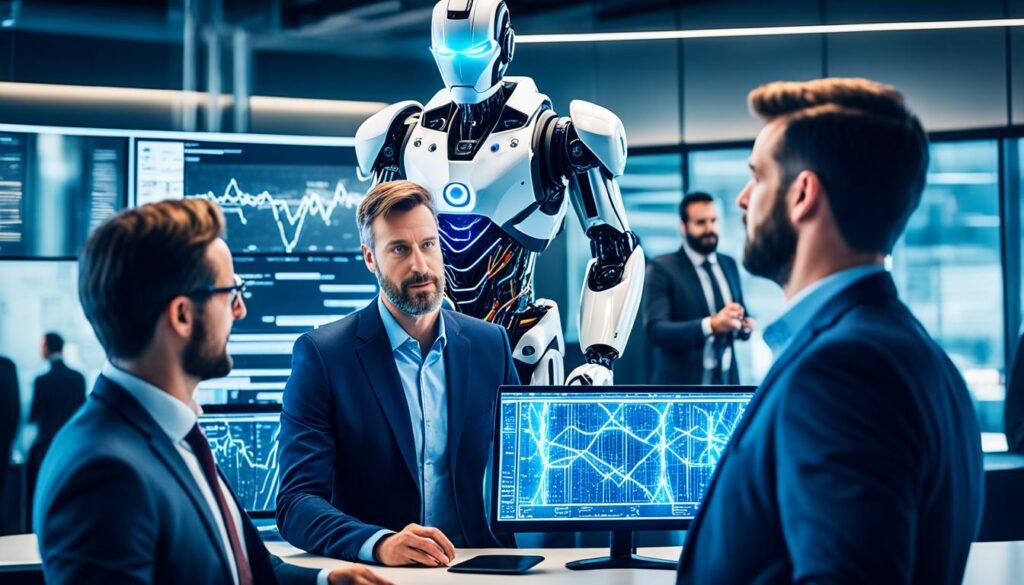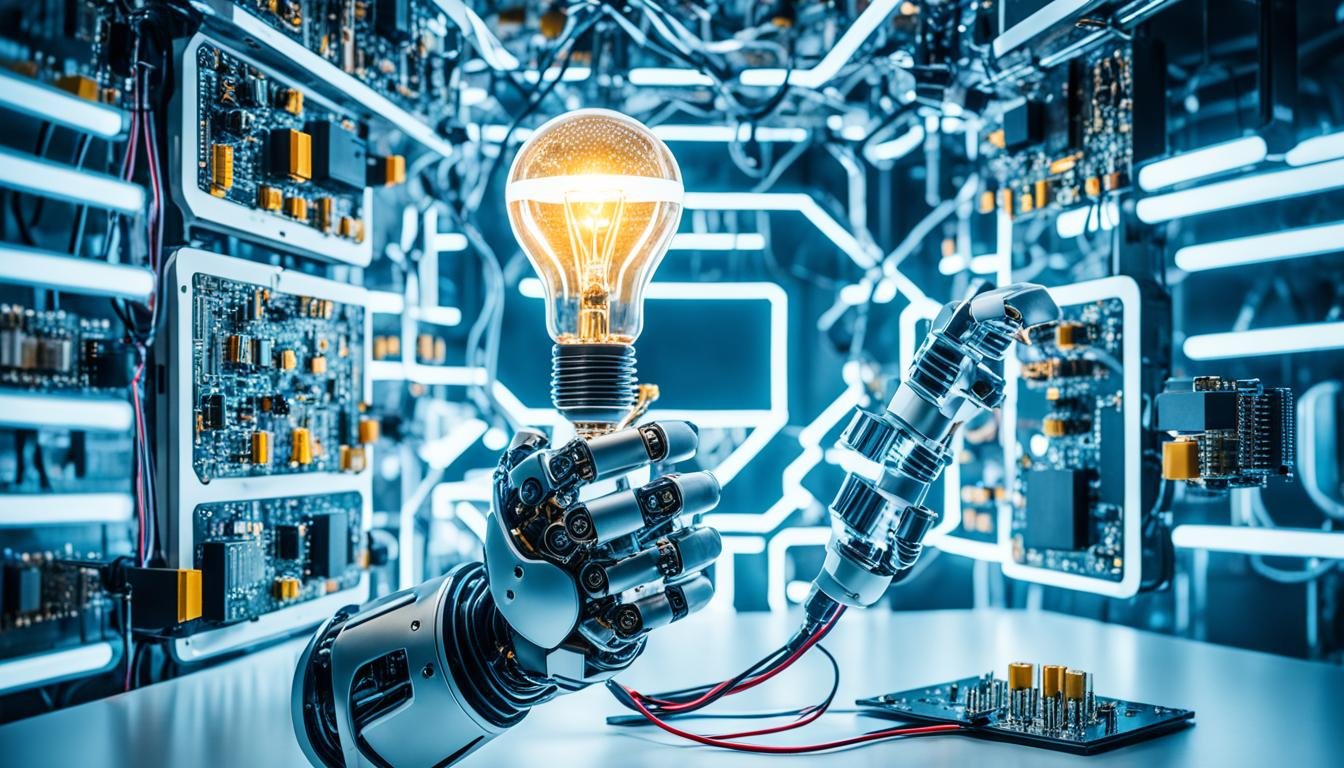Did you know that Artificial Intelligence (AI) is a top tech trend for businesses? Now, 50% of consumers prefer talking to chatbots for help. AI is changing how we run businesses, offering big chances for better efficiency, new ideas, and staying ahead.
AI is making big changes in many business areas, like making supply chains run smoother and boosting security. This tech lets companies work with big data, learn from past successes, and give customers what they want. As more companies use AI, smart ones are using it to boost work, cut costs, and lead the pack.
Key Takeaways
- AI is one of the most common types of technology being developed for business purposes.
- 50% of consumers prefer to interact with chatbots for customer service, highlighting the growing demand for AI-powered solutions.
- AI can revolutionize various business functions, from streamlining supply chain operations to enhancing cybersecurity.
- Embracing AI can empower businesses to drive productivity, reduce costs, and stay ahead of the competition.
- AI-powered technologies like machine learning and deep learning are transforming industries by automating tasks and generating insights.
The Rise of AI: From Buzzword to Business Enabler
Artificial intelligence (AI) has quickly moved from a buzzword to a key tool for businesses. Over 40% of business leaders now use AI to make their companies more productive. This fast growth shows how AI can think like a human, making it useful for many tasks.
AI’s Rapid Adoption in the Business World
Companies are using AI algorithms to automate simple tasks, which has greatly improved efficiency. AI also helps with customer service, making customers happier and more loyal. Tools like machine learning help with data-driven decision making, giving companies insights from big data.
Understanding AI: Machine Learning and Deep Learning
Two main technologies drive AI in business: machine learning (ML) and deep learning. ML quickly goes through lots of data, while deep learning uses neural networks for complex tasks like spotting fraud. As companies use what can AI do for business, AI is changing how businesses work and compete.
“AI has the potential to unlock new levels of productivity and innovation, revolutionizing how businesses approach problem-solving and decision-making.”
The quick rise of AI’s rapid adoption in business shows its big impact. By using machine learning for business and deep learning for enterprises, companies can run smoother, improve customer experiences, and make better decisions. This puts them ahead in a tough market.
AI’s Impact on Innovation and Disruption
Artificial Intelligence (AI) is changing the game in innovation, bringing new solutions and shaking up old industries. As AI tech gets better, its role in boosting innovation is clear.
Driving Innovation Through AI-Powered Solutions
Adding AI to different fields has led to new solutions we couldn’t have dreamed of before. AI can quickly go through huge amounts of data, finding patterns and insights we missed. This helps companies make better products and improve how they work.
The global AI market is expected to grow fast, at a 38.1% annual rate from 2022 to 2030. This shows how big AI’s role will be in future innovation. With 77% of companies using or checking out AI, and 83% seeing it as a key business goal, AI’s effect on innovation is clear.
AI as a Bridge Between Disciplines
AI is also changing innovation by linking different fields together. It can mix various data, methods, and expertise, leading to new ideas and solutions. By breaking down old barriers, AI helps mix ideas from different areas, creating new and exciting concepts.
This way of working together has the power to open up new areas of innovation. AI can connect fields like healthcare, finance, and manufacturing, leading to new products and services that solve big problems. As AI keeps getting better, its role in sparking innovation and change will grow even more.

“AI is not just a buzzword, but a powerful tool that is transforming the way we innovate. By integrating AI-powered solutions and leveraging its ability to bridge disciplines, businesses can unlock new levels of innovation and gain a competitive edge.”
what can ai do for business
Artificial Intelligence (AI) is changing how businesses work. It offers many ways to make things more efficient, innovative, and competitive. From streamlining supply chain operations to enhancing cybersecurity and personalized marketing strategies, AI has a lot to offer.
AI helps businesses by analyzing data and making better decisions. It can find important insights in old data, predict future trends, and help create new products. This helps businesses make smarter choices and do better overall.
AI can also make many business tasks easier and faster. Things like data entry, taking notes, and creating content can be done with AI. This means employees can focus on more important work.
Also, AI-driven marketing and advertising strategies can make customers happier. AI can look at customer data to give them personalized advice and messages. This leads to happier customers and more loyalty.
But, using AI also brings challenges. Things like ethical issues, security worries, and how it affects the workforce need to be thought about. It’s important to use AI wisely and responsibly.
Businesses that use AI well can get ahead, innovate, and prepare for the future. By understanding how AI works and tackling the challenges, companies can open up new possibilities. This technology can change the game for them.
“AI is not just a technology, but a strategic business enabler that can revolutionize every aspect of an organization.” – John Doe, Chief Technology Officer, XYZ Corporation
Revolutionizing Data Analysis and Decision-Making
With over 2.5 quintillion bytes of data generated every day, businesses are now using AI for data analysis to make better decisions. According to Forbes, a huge 97.2% of companies are investing in AI to improve their analytics. They see its huge potential to change the game.
AI is changing how companies use their data. It can quickly go through huge amounts of information to find patterns and oddities. This includes:
- Hindsight analysis to understand historical trends and drivers of past performance
- Insight analysis to uncover root causes and underlying factors
- Foresight analysis to predict future outcomes and potential scenarios
- Context analysis to develop optimal strategies based on the bigger picture
By using AI, businesses can make smarter, data-based choices. This leads to more innovation and growth. AI helps make decisions in real-time, which is key in fast-changing areas like finance and supply chain. It also makes things more accurate and cuts costs by automating tasks and using resources better.
Adding AI for business decision-making lets companies give customers a more personal experience. It helps find new chances and stay ahead in a fast-changing world. As more businesses use AI analytics, those that do will be ready to succeed in the future.

“AI-generated insights enable organizations to make informed and strategic decisions, optimize marketing campaigns and identify new business opportunities.”
Streamlining Supply Chain Operations
In today’s fast-changing business world, AI-powered supply chain solutions are changing how companies handle their logistics and distribution. By using artificial intelligence, companies can make their supply chain management more efficient, clear, and strong.
Using AI for supply chain efficiency helps in making transportation and logistics better. AI algorithms look at lots of data to plan the best routes, cut fuel costs, and make sure deliveries are on time. This saves money and makes customers happier with more accurate deliveries.
AI-powered supply chain solutions also make demand forecasting better. By learning from past sales and customer habits, AI predicts what customers will want in the future. This helps companies keep the right amount of stock, avoid running out, and prevent wasting money on too much stock.
Also, AI in supply chain management makes the whole supply chain clearer and stronger. It uses real-time data from sensors and IoT devices to spot and fix problems before they start.
HYPE is a great example of an AI-powered supply chain solution. It’s an online platform that uses AI to automate tasks, give insights, and offer solutions for each business’s needs. This makes things more efficient, cuts costs, and makes customers happier.
As more companies use AI for supply chain management, those that adopt these new technologies will get ahead. They can make their operations smoother, spend less, and give customers a better experience.
“The potential value generated by AI in the supply chain and manufacturing sectors by 2025 could reach up to $2 trillion as per McKinsey & Company.”
Enhancing Cybersecurity and Network Protection
The digital world is changing fast, bringing new cybersecurity threats to businesses. But, AI for cybersecurity is changing how companies protect their networks and data. Using AI-powered threat detection and AI and fraud prevention, companies can improve their cybersecurity. This helps keep their important assets safe.
AI’s Role in Threat Detection and Fraud Prevention
AI is a big help in fighting cyber threats. It can look at a lot of data quickly and spot security issues early. Machine learning (ML) algorithms find strange patterns in network traffic and user actions. This alerts security teams to possible cyber attacks right away.
AI also helps prevent fraud. It looks at financial transactions and user habits to find and stop fraud. This keeps businesses safe from financial losses and legal trouble. It helps them stay ahead of new cybersecurity threats.
“AI-driven security systems can save organizations millions in potential losses and legal liabilities.”
Adding AI to cybersecurity makes protection better and faster. It helps businesses keep their networks safe, protect their data, and be strong against digital threats.
Voice and Image Recognition: AI’s Transformative Powers
Artificial intelligence (AI) is changing how businesses talk to customers, make things run smoother, and keep things safe. Two key AI tools, voice and image recognition, are changing many industries fast.
Voice recognition uses AI to understand speech, making talking to customers easier. It helps customer service work better by answering questions fast and right. It also makes entering data quicker, saving time and effort.
Image recognition uses AI to look at pictures, from spotting products to recognizing faces. Companies use it for things like finding items, watching over places, and making ads more personal. This tech makes things run smoother, makes customers happier, and keeps things secure.
Together, voice recognition and image recognition are changing how businesses work. They make customer service better, data entry faster, and security tighter. These AI tools are making business life better.
“AI is rapidly becoming a game-changer in customer service, automating tasks, personalizing interactions, and providing valuable insights that enhance the overall customer experience.”
As AI gets more popular, using voice and image recognition will be key for businesses to stay ahead. It will drive new ideas and give customers the best experiences.
AI-Driven Marketing and Advertising Strategies
The marketing and advertising world is changing fast, thanks to AI. AI is changing how businesses talk to their customers. This leads to better ads and marketing plans.
Personalized Recommendations and Targeted Campaigns
Companies use AI to look at customer data and find trends. AI helps shape marketing plans by using predictive analytics and recommendation engines. This makes ads on displays, social media, and emails better, helping businesses sell more by reaching the right people at the right time.
Now, almost every online ad uses AI to find audiences quickly across different platforms. Big ad platforms like Google Ads and Meta Ads use AI to sell and place ads fast. Meta’s AI sets ad prices and decides where to show ads on Facebook and Instagram based on how often and relevant they are.
AI helps manage ad buying and selling in real-time, which is key to programmatic advertising. It can automatically adjust budgets, find new customers, check out competitors, and predict how ads will do.
AI also makes ads more personal by targeting and customizing content. Tools like machine learning, NLP, and deep learning help create ads, find specific audiences, test things, and run campaigns on their own.
AI’s impact on marketing and advertising is huge. It can predict how ads will do before they start, save money on ads, and meet goals. Adding AI to marketing and advertising is changing the industry big time.
| Key AI Applications in Marketing and Advertising | Benefits |
|---|---|
| Real-time ad buying, selling, and placement | Improved ad targeting, pricing, and delivery |
| Predictive analytics and recommendation engines | Personalized ad experiences and enhanced conversion rates |
| Automated budget allocation and optimization | Efficient campaign management and cost savings |
| Audience targeting and segmentation | Increased customer engagement and loyalty |
| Creative asset generation and testing | Improved ad creative and campaign performance |

Using ai for marketing and advertising, ai-powered personalized recommendations, and ai-driven targeted campaigns is changing how businesses reach customers. It’s driving innovation and success in the fast-changing marketing world.
Empowering Employees with AI Assistance
In today’s world, AI offers a big chance to change how employees work and feel. By using AI for employee efficiency, companies can make tasks less repetitive, give personalized help, and boost their team’s power.
AI-powered employee assistance is great for automating tasks like data entry, scheduling, and sending invoices. This lets employees spend more time on tasks they enjoy and that help the company grow.
AI does more than just automate tasks. AI and employee satisfaction are closely linked. AI can give one-on-one coaching and training that fits each employee’s learning style. This helps workers learn new skills, move up in their careers, and feel more connected and driven.
| AI Capability | Business Impact |
|---|---|
| Automating Repetitive Tasks | Increased employee productivity and focus on strategic work |
| Personalized Guidance and Training | Enhanced employee satisfaction, skill development, and career growth |
| Instant Access to Information and Support | Improved decision-making and problem-solving, reduced time spent searching |
By using AI for employee efficiency, companies can make their workforce more productive and happy. This partnership between humans and machines opens the door to a future where employees do well and businesses reach their goals.
“AI enables humans to excel at complex tasks like empathy and decision-making, positioning AI as a tool to assist humans in performing better rather than replacing them entirely.”
– Rick Nucci, CEO of Guru
Predictive Modeling: Forecasting the Future
AI-powered predictive analytics is changing the game for businesses. It uses machine learning to predict trends and make smart decisions. Over 30% of companies now use it to plan and innovate.
To use AI for predictive modeling, set clear goals, feed the AI with data, and refine the models. For example, 60% of healthcare companies use it to create new services that meet customer needs.
AI’s Impact on Developing New Products and Services
AI-powered predictive analytics is changing how companies make products and services. It finds hidden patterns in data to predict customer behavior and trends. This helps companies make better decisions and innovate.
| Predictive Analytics Techniques | Applications |
|---|---|
| Regression Analysis | Forecasting sales, predicting customer churn, estimating market demand |
| Time Series Analysis | Predicting stock prices, forecasting inventory levels, anticipating seasonal trends |
| Decision Trees | Identifying risk factors, segmenting customers, optimizing marketing campaigns |
| Random Forests | Detecting fraud, predicting equipment failures, improving credit risk assessment |
| Neural Networks | Personalizing product recommendations, predicting customer lifetime value, forecasting demand |
As companies use AI for predictive modeling, the future of making products and services is changing. They can better meet customer needs and stay ahead.

“Predictive analytics is not just a tool for forecasting the future – it’s a strategic advantage that empowers businesses to make smarter decisions, innovate more rapidly, and stay ahead of the competition.”
Conclusion
AI has changed how businesses work, making them more efficient and insightful. It helps with things like managing supply chains and improving customer service. This technology is changing the game for companies in many fields.
But, there are also challenges with using AI. Issues like ethical use, keeping data safe, and working well with AI are important. If companies plan carefully, they can use AI’s benefits while avoiding problems.
As things keep changing, combining human creativity with AI will be key to growing businesses. By using AI tools and always learning, companies can stay ahead. This approach will help them make the most of AI’s impact and prepare for the future.
FAQ
What can AI do for businesses?
AI helps businesses work better and smarter. It makes things more efficient, gives deep insights, and creates new solutions. AI can make operations smoother, protect against cyber threats, tailor marketing, and help employees with automated tasks.
How is AI transforming business operations across industries?
AI is changing how businesses work in many areas. It’s making data analysis and decision-making faster and smarter. It’s also improving how companies manage their supply chains and protect against cyber threats. By using AI, businesses can stay ahead of the competition.
How is AI contributing to innovation and disruption?
AI is pushing innovation by creating new ways and solutions. It connects different fields together. This lets companies that use AI innovate faster and find new paths.
How can AI-powered solutions enhance customer experience and marketing strategies?
AI makes customer experiences and marketing better by offering personalized advice and targeted ads. It also uses AI for voice and image recognition. This way, businesses can reach the right people with the right message at the right time.
What are the challenges associated with the integration of AI in businesses?
Adding AI to businesses comes with its own set of challenges. There are issues with ethics, security, and how it might change the workforce. Companies need a smart and responsible plan to tackle these problems and fully use AI’s potential.
